According to statistics from the American Kennel Club, boxers are the 14th most popular breed in the US, and one of the top choices among families.
And there are a lot of reasons to love boxer dogs. Boxers are loving, loyal, highly intelligent and, even as adults, given to a lot of charming silliness.
They are also however a larger, very energetic breed, so one of the first questions any new boxer parent has is what should I feed my boxer dog?
Good nutrition is especially important for a boxer dog's health, but just what they should be offered to eat depends on their life stage, their energy levels - which, as mentioned is usually remarkably high - and to a certain extent their 'personal' tastes.
Here we are going to take a closer look at nutrition advice for boxer dogs, as well as at some of the best dog foods out there to meet their needs, so you can ensure your boxer is well-fed, happy, and healthy.
Our Top Picks
Best Overall: Nulo Freestyle at Chewy (See Price)
Best Wet: Taste of the Wild at Amazon (See Price)
Best for Puppies: Taste of the Wild at Chewy (See Price)
Best for Seniors: Nulo at Chewy (See Price)
Best for Dogs with Food Sensitivities: Blue Buffalo at Chewy (See Price)
About Boxer dogs and their genetics
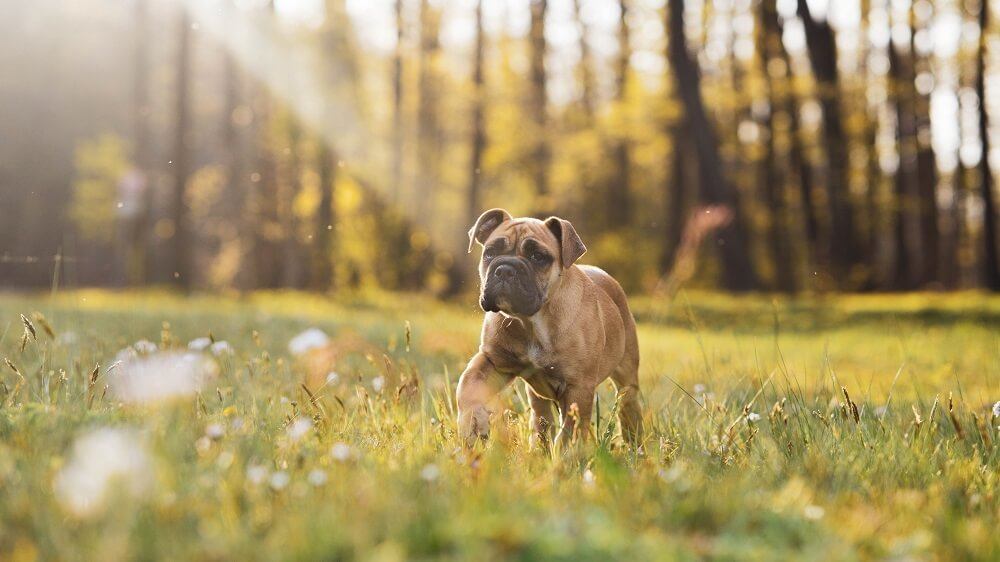
Photo by Anna Dudkova on Unsplash
The boxer dog look is one most people recognize.
When full-grown - usually at between 18 and 24 months, boxers keep growing for a while - a boxer is reasonably tall, on average between 23 and 25 inches - and weigh between 55lbs and 70lbs.
They have a short, single layer coat - great if you worry about shedding ruining your home and clothes - and, while all boxers have some fawn coloring may also be have white, black, and brindle coloring.
Boxers can trace their ancestry back to 19th century Germany (1).
Breeders took the traits they most admired in several different hunting dog breeds, but most specifically the now extinct Bullenbeisser dog, which was a combination of a mastiff and a bulldog, to 'create' a more athletic hunting dog capable of running for miles at a decent speed (2).
So, if you ever wonder why your boxer never seems to tire of running and jumping, it's because doing so is quite literally in his genetic makeup!
This love of being active does call for a lot of energy, which is why meeting your boxer's nutritional needs is so important.
What to feed Boxer dogs?

Protein Rich Foods: Chicken, Fish, Eggs, Beef, Seeds, Milk
Boxer puppies tend to be a whirlwind of energy and curiosity.
It is not unusual for them to race through the house, or across the yard, at breakneck speeds for a seemingly impossibly long time (before falling fast asleep in seconds to 'recharge').
A high-quality puppy food is a must, one that is high in protein, but not too high in empty calories, as, even as active as they are boxers are prone to obesity if fed too many calories which can not only slow them down but be bad for their overall health and shorten their lifespans (3).
What to feed a Boxer puppy?
Ideally a boxer puppy should be given food that is specifically formulated for large puppies and fed several smaller meals throughout the day.
Boxer puppies do tend to eat quickly (they have other more exciting things to do) and as the breed is prone to a dangerous condition called bloat.
This is a potentially fatal digestive condition, in which a dog's stomach twists because it fills too quickly with gas or fluid.
If their stomach flips it is difficult to right it and the pressure on their internal organs can lead to rapid death.
Therefore, feeding a fasting eating boxer puppy a large meal is often not a good idea, as that increases the risk that their habits will lead to excess gas.
Three to four small meals a day is a better idea than two or three large ones.
What to feed an adult Boxer dog?
When to transition to adult food is not always as cut and dried for boxers as it is for other breeds.
Research has found that purebred boxers often continue to grow for a full year beyond the average for other medium to large breeds, so may need to remain on puppy food for up to 18-24 months (4).
A talk with your vet will help determine when the right time to make the transition is for your unique pup.
When they do transition to adult dog food, boxers need less protein as their growth has stopped, and as little in the way of fillers and 'empty' calories as possible, as maintaining a healthy weight is crucial for adult boxer dogs.
Therefore, as they age and slow down, boxer parents should consider transitioning their senior boxer to a weight management formula, to help ensure they stay slim in their later years.
They can also be fed larger, less frequent meals, although you should still be mindful of a boxer's extra susceptibility to bloat.
Warning: One important note here. Although they are a clever idea for some dog breeds, most vets recommend that boxers not be fed from a raised dog bowl, and they should always be fed at floor level.
This is because a fairly large volume of research has found that eating from a raised dog bowl increases the risk of bloat significantly for deep chested breeds like the boxer (5).
What do Boxer dogs like to eat?
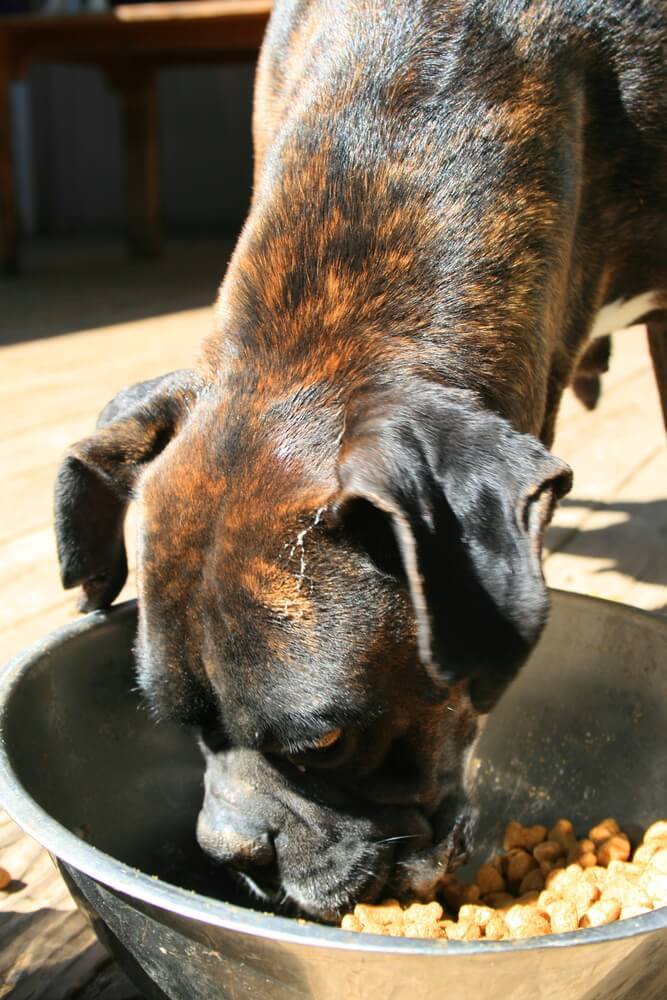
Because they are very social pups most boxer dogs would like to eat whatever their human family eats!
As they are so charming - and cunning - it's hard to resist sneaking your boxer a morsel or two of your dinner, but the amount of 'human food' boxers are allowed should be extremely limited, as most human food is too calorie dense, too fatty and contains too many calories from sugar to be healthy for them.
There are a few exceptions to this rule.
Most boxer pups will enjoy the occasional scrambled egg, and the protein eggs contain can be excellent for them, as long as you do not use the butter, milk, or salt you might use for your own scrambled eggs when cooking them for your pup!
There are some veggies that are good for boxer dogs too, which is something we will discuss in greater detail in a moment.
What foods are bad for Boxers?
Some foods are universally bad for dogs, and can, in some cases, prove fatal if ingested.
These include: Chocolate, grapes, onions, walnuts, raisins and artificial sweetener Xylitol.
We mention the latter as some peanut butters, which most boxers love and is not in itself bad for them, contain Xylitol instead of natural sugar, and this can be toxic for pups.
With boxers specifically in mind they simply do not need empty calories. That means that fried foods should be off the menu for them and meats they are given should be as lean as possible.
What vegetables can Boxer dogs eat?
As is the case for their humans, some vegetables can serve as an excellent source of extra, low calorie nutrition for boxer dogs. These include all the following:
Celery: Another crunchy vegetable that makes a great, low calorie alternative to sometimes overly calorific dog treats, celery is packed full of vitamins and antioxidants and even helps freshen boxer doggy breath.
Green Beans and Peas: Green beans - of any kind - are favorites of some boxer dogs, probably because they have a mild taste and are easy to digest. Try to only give your pup fresh cooked beans though, as canned green beans often contain higher levels of sodium than they need.
The same is true of peas. Peas also contain lots of nutrients, but canned peas contain too much sodium. Frozen peas, on the other hand, should be fine to feed your boxer pup, providing you cook them first of course.
There are some vegetables that boxers should not eat, including onions, mushrooms, and avocados, all of which can be toxic for them.
It should also be noted that provided you have chosen a high-quality dog food. feeding your boxer veggies is not a must, especially as many will not eat them unless they are well hidden in more appealing food!
Best foods to feed Boxer dogs
We have talked a lot so far about the importance of choosing the right, high quality dog food to feed your boxer dog.
But given that there are so many dog foods on the market, how do you make the right choices?
To help you, we have come up this list of the best dog food for boxers at various stages of their life, based on both the opinions of our boxer dog taste testers and the online reviews left by other boxer dog pet parents.
Best dog food for Adult Boxer Dogs
1. Nulo Adult Dry Dog Food
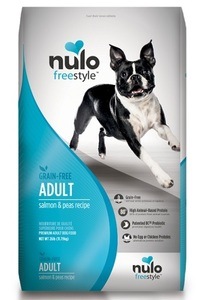
If you prefer the convenience and relative economy of a high-quality dry dog food, then Nulo is an excellent choice.
It is a grain free formula - some boxers do seem to be grain sensitive, and some grains increase gas - that makes use of several high-quality proteins while being one of the lower carb choices for adult dogs, helping to ensure your boxer gets all the nutritional goodies he needs without getting 'fat'.
Pros
- Contains several lean protein sources including lamb, salmon, and turkey. Is a 'meatier' dry dog food than some.
- Is a grain free food, so an excellent choice to prevent possible stomach issues.
- Bite sized kibble is easy to digest. Lower in carbs than most dry dog foods, so an excellent choice for weight management. Boxer pups seem to love the taste.
Cons
- Boxers can be picky, and for some a dry dog food diet is not varied or appealing enough.
- Not an inexpensive choice.
2. Merrick Real Grain-Free Dog Food
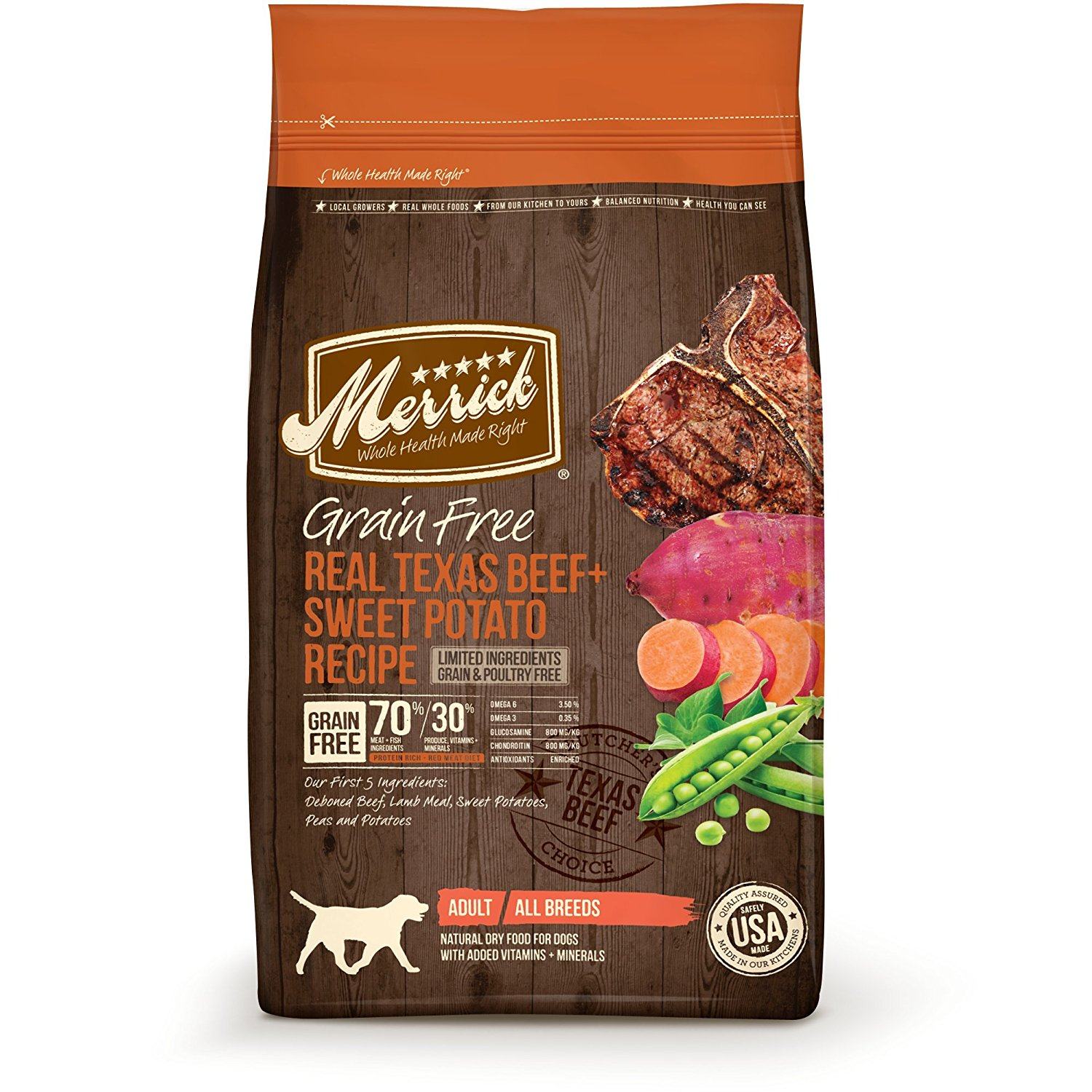
This dog food is not only AAFCO certified for All Life Stages but is also SQF Institute Certified (6).
This recipe is grain and gluten free and avoids the use of nasty fillers - which it a good choice for boxers with sensitive stomachs.
It contains 38% protein and 15% crude-fat which is great for this high energy breed, with 385 kcal/cup.
Another reason that this is a great kibble for Boxers are the ingredients.
First listed ingredient in each of their formulas is meat (beef, chicken, salmon, lamb, turkey, venison rabbit or duck) followed by digestible carbohydrates like sweet potato.
Pros
- Contains several high quality protein foods.
- Merrick is cooked in the USA in organically certified kitchens and never uses ingredients from China.
- It is free corn, wheat, soy and has added glucosamine and chondroitin for healthy joints.
- All stage formula.
Cons
- Not an inexpensive choice.
3. Taste of the Wild High Prairie Can Dog Food
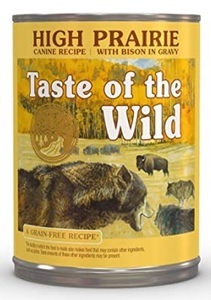
Some boxers crave more flavor - and love gravy - and so may eat better, and be more satisfied, when given a wet dog food.
It can be hard to find a nutritionally sufficient wet dog food for a larger dog like a boxer, but Taste of The Wild High Prairie Can Dog Food is an excellent choice.
It is high in lean meat content and grain free too, making it easier to digest and better tolerated by boxers with more sensitive stomachs.
Pros
- Recommended by a number of boxer dog breeders.
- High lean meat content includes bison, venison, and lamb.
- As bison is a lower calorie version of beef, boxers get taste they love with less fat.
- Easy to feed, can be fed with kibble or as a standalone meal.
- Grain free food which may be an excellent choice for boxers with grain sensitivities.
Cons
- A more expensive day to day feeding choice than dry dog food.
4. Stella & Chewy's Freeze-Dried Raw Meal Mixers
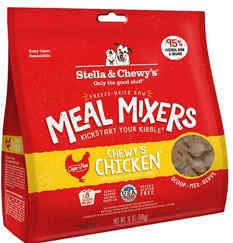
As we mentioned, picky boxer dogs will often refuse a diet of just dry kibble, and as boxers are smart, but stubborn dogs they may refuse to eat it at all, however good it is for them.
Adding a freeze-dried meat topper like this one can solve that problem though, without the mess and extra expensive a traditional wet dog food comes along with.
Stella & Chewy's Freeze-Dried Raw Grain-Free Dog Food Topper is an excellent, affordable option that is also grain free!
Pros
- Great way to add more lean meat into your adult boxer's diet.
- Dogs seem to love the taste.
- Small, chewy morels are easy to eat and digest.
- Makes use of lean proteins like chicken and high-quality beef.
- One of the more inexpensive high quality raw dog food toppers in the market.
Cons
- Needs to be refrigerated at all times.
- Spoils quickly, so must be consumed within a few days of purchase, whereas canned wet dog food has a much longer shelf life.
Best Puppy Food for Boxers
Taste of the Wild High Prairie Large Puppy Food
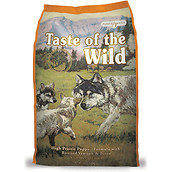
A growing boxer puppy grows fast, and they need lots of protein to support the rapid growth of their bones and muscles.
The high-quality lean proteins in this dry puppy food are specially formulated to meet the needs of large, faster growing puppies like boxers, and they seem to love the taste too!
Pros
- High protein content is great for fast growing boxer pups.
- Meaty taste most pups enjoy.
- Makes use of roasted bison and venison, lower calorie, lean meats that still have an appealingly strong taste.
- Small sized kibble is easy for even young puppies to chew. Grain free formula prevents possible stomach upsets.
Cons
- Some pups may need a topper added to the food to make it more appealing.
Best Dog Food for Senior Boxers
Nulo Senior Grain Free Kibble with Glucosamine and Chondroitin
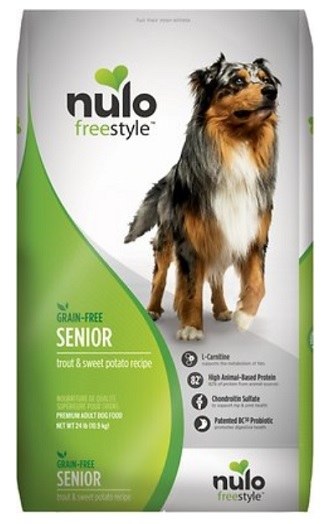
Weight management is especially important for senior boxers, as the breed’s tendency to easily slipping into obesity can be especially dangerous to their health as they age.
They also tend to have trouble with their joints.
This kibble combines great lean meats and fewer carbs with naturally sourced Glucosamine and Chondroitin for joint health to provide an excellent boxer food choice for an older pup.
Pros
- Lean protein sources include tasty trout and turkey.
- Lower in carbs.
- Includes Glucosamine and Chondroitin for joint health.
- Is grain free, preventing stomach upsets in dogs who are sensitive to grain.
Cons
- Dry kibble may be hard for older boxers to chew.
Best Dog Food Boxers with Food Allergies
Blue Buffalo Basics Limited Turkey and Potato
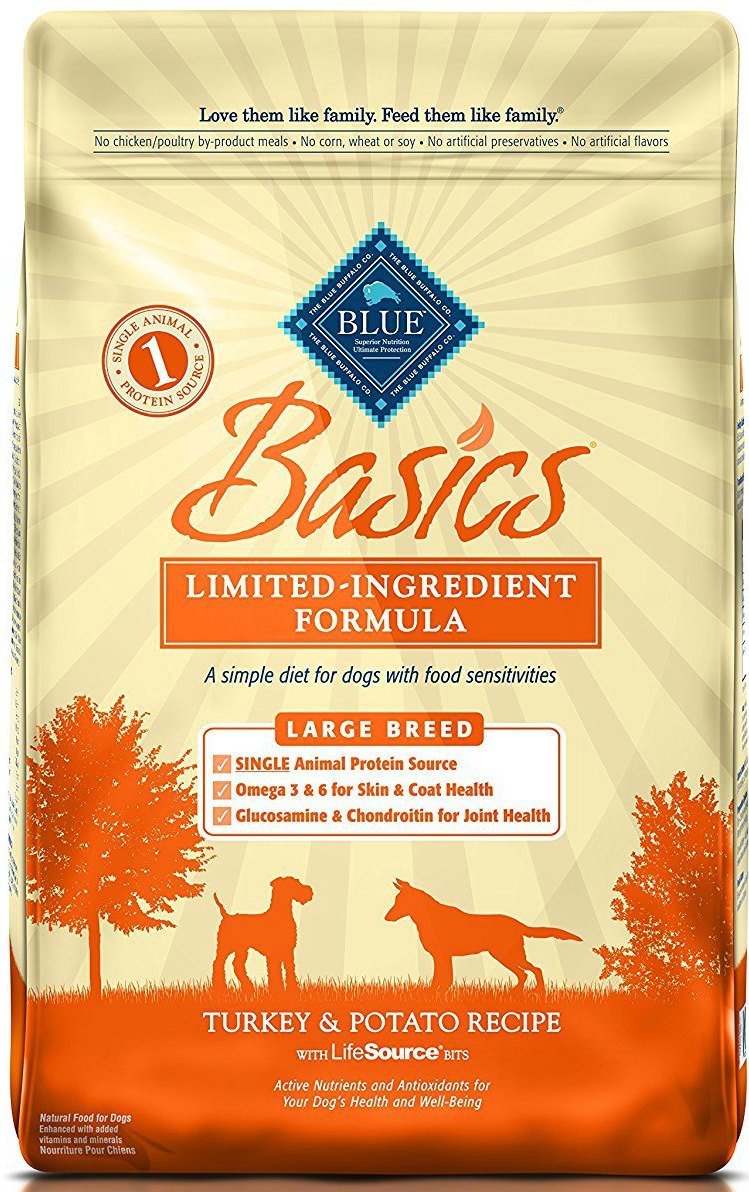
Some boxers, no matter their age, have sensitive stomachs, especially when it comes to grains.
ften the best choice for them is a limited ingredient food like this one.
As turkey is the number on ingredient pups get lots of lean protein, and Blue Buffalo's vitamin enhanced Lifebits offer extra nutrients for good health.
Pros
- Limited ingredients prevent stomach upsets.
- Turkey is a great source of lean protein.
- Extra vitamins and minerals thanks to the inclusion of Lifebits supplements
Cons
- Some boxers may find the taste too bland for their liking.
***
Given this information you might be wondering what diet is best for your Boxer - raw or commercial?
Whatever method you choose, as an owner it’s your responsibility to research the feeding method that works for you and your dog and make sure they are getting the best nutrition possible.
What you need to know about raw diet for Boxers
Raw feeding has become a popular alternative to commercial dog food because owners believe that it more closely resembles dogs’ natural diet.
Another benefit to raw feeding is that owners know exactly what they’re feeding their dogs, without having to worry about cheap fillers, preservatives, and artificial ingredients taking a toll on their dog’s health.
Of course, like most things, raw feeding also has some cons that owners should be aware of.
The Meet the Boxer issue of Dogster magazine (formerly Dog Fancy) does a good job of explaining some of the benefits and drawbacks:
“There are varying opinions on raw diets, which consist of raw meat and bones that you feed to your dog. Some believe a raw diet improves dogs’ skin, coat, and teeth, and increases their stamina and vitality. Others caution against e. coli, parasites, and other risks associated with raw meats. These diets must be supplemented by some source of fiber and vitamins to ensure the full range of nutrients.”
One raw diet that many owners stand by is BARF, which stands for Biologically Appropriate Raw Food.
This diet consists of meals made with meat, offal, bones, vegetables, fruits, eggs, and other ingredients like flaxseed and kelp. BARF food can be prepared at home or purchased in pet supply stores.
What you need to know about commercial dog foods
To be safe, it’s generally recommended that owners feed their dogs a high quality commercial dry dog food, since these foods are scientifically formulated to meet dogs’ nutritional requirements and don’t carry the same risk of contamination that comes with raw diets.
Commercial dog food is generally more affordable, convenient, and less time consuming than making your dog’s food at home.
Of course, commercial dog food is not all good.
Owners should do their best to avoid bargain brands or grocery store brands and instead purchase their dog’s food at pet supply stores or by a vet’s recommendation.
It’s important to look at the list of ingredients and make sure that the top five include named meat sources and other quality ingredients.
One way to make sure your dog’s food meets important nutritional requirements is looking for an AAFCO statement.
By finding a quality kibble formulated for all life stages, you can keep your Boxer on one food and avoid triggering digestive issues caused by switching foods.
Boxer dog diet FAQs

What are the nutritional requirements for Boxer dogs?
Adult Boxers require approximately 1,100 to 2,400 calories a day depending on their size and activity levels.
Boxers should be on a diet that’s high in protein, ideally around 30%.
How much food do you feed a Boxer dog?
Boxers should generally be fed between one and three cups of food per day, split into two meals.
Make sure that you measure your dog’s food per their weight and adjust based on energy levels.
What type of dog food is best for Boxers?
Because Boxers have sensitive digestive systems, a carefully followed raw diet taken on with the advice of a vet can be a good option.
If you choose to go with a commercial diet, pay close attention to the ingredients.
Since bloat is a danger with this breed, consider using a slow-feeder will go a long way to avoid dog-bloat.
Can you mix raw & dry dog food?
It is possible to feed your dog a diet a mix of dry and raw food, but these should be given to the dog separately to avoid digestive issues.
Since Boxers have sensitive digestive systems to begin with, one diet is usually best. Any changes should be discussed with a vet first to make sure that their nutrition isn’t thrown off.
***
Do you have a Boxer? Do you feed him one of the foods on our list or something else? We’d love to hear! Let us know in the comments!

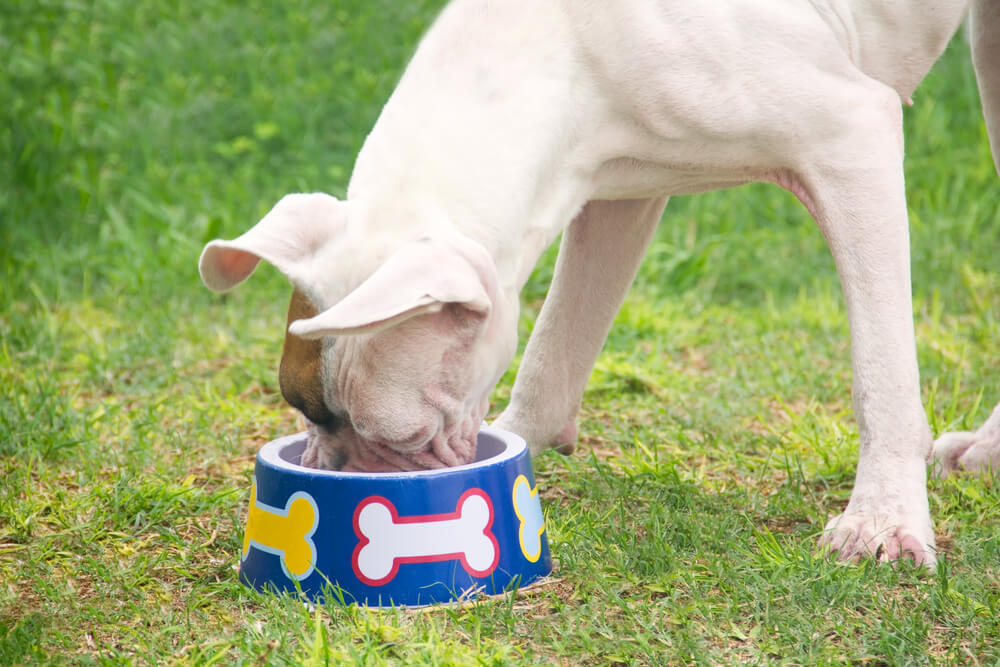

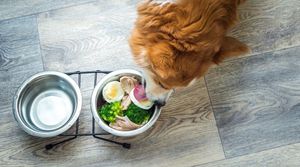
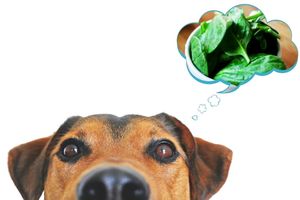
Hello, I need some advice here as I have been dealing with this for over a year now. I have a 2 year old boxer (female) who is have stomach issues. In a sense that she is ok for 1 week then wanting to eat grass another week and wanting to go outside middle of the night because her stomach is NOT settled. We are feeding her a raw diet since we got her and I truly think her stomach can’t digest it. We put in probiotics mixed greens powders etc but it truly isn’t working and have even tried switching brands of raw food. (We are giving her the brand big country raw food…. Do you think I should be switching to dry food?? We have done allergy testing etc to make sure she wasn’t allergic to the food and still nothing…
Need advice please…
Sounds awful, poor thing.
Have you done a thorough exclusion diet? A cooking / broth step will really help here, on a protein you know she’s OK with.
In short, at a guess, her gut is compromised, it hasn’t fully repaired and raw is thus not working. Exclusion diet, starting with broth and consider adding an amino acid and probiotics supplement. Finally, if she can eat a good quality dry and not have this reaction it’s at least an option for a period of recovery. As always, discuss any changes to her diet with your vet beforehand.
Best of luck!
Thank you for the diet info. We have just taken in our first boxer( from a Humane Society) who does seem to have food allergy issues ( itching) so we want to get her on track, diet wise. We have fed previous dogs a raw diet( Wolfhounds and Danes) and had great success with it, but I realize that that Merrick can be a good alternative.
Hey Louise! Congrats on your first Boxer pup! It can get overwhelming about which diet to choose for our dogs. Certainly the Merrick brand is a good food to try, this top-tier kibble is allergy-friendly being grain-free and contains no poultry! Also perhaps you might like to read this article (https://ipupster.com/best-hypoallergenic-dog-food-for-allergies/) with additional choices of dry-kibble which may help your dog’s journey to picking a food that addresses her specific needs. And, as always, discuss your choice with your vet.
Best of luck!